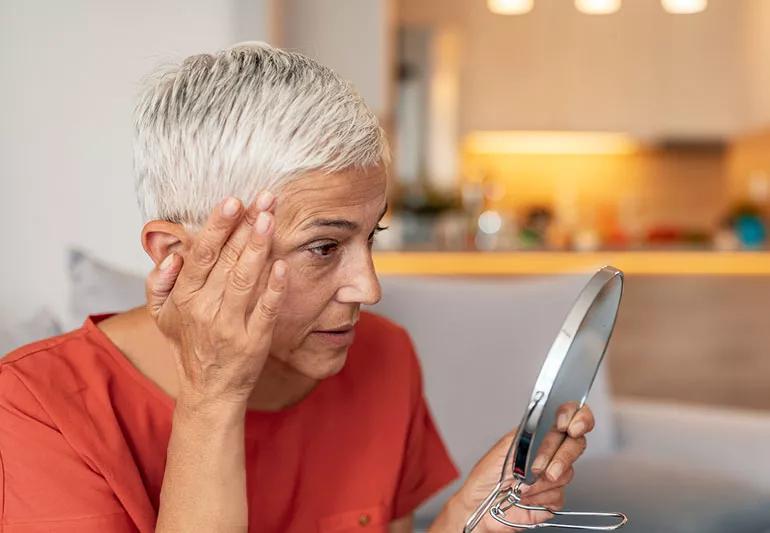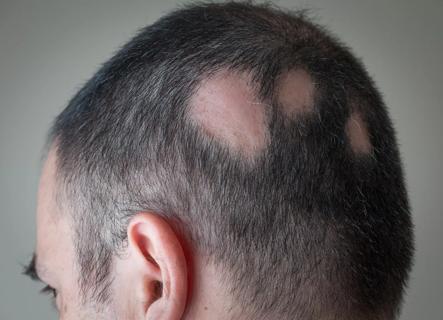There’s a difference between hair loss and hair growth when it comes to biotin’s benefits

If you find yourself browsing the hair care aisle or searching the internet for hair treatments, one thing that might pop up is biotin. This B vitamin has a reputation for helping your locks stay healthy, and it’s frequently recommended by dermatologists to help with hair loss.
Advertisement
Cleveland Clinic is a non-profit academic medical center. Advertising on our site helps support our mission. We do not endorse non-Cleveland Clinic products or services. Policy
But can biotin actually help your hair grow, too?
“We find biotin to be very helpful for hair disorders,” says dermatologist Wilma Bergfeld, MD. “It also makes nails thicker, and oral biotin is exceedingly safe.”
Does this mean it can also help your hair longer? Not quite. Biotin contains essential proteins that help with the development of your skin, nails and hair, but this doesn’t mean it’s a miracle product for your locks. Let’s brush up on what biotin can — and can’t — do for your hair.
If you’re dealing with hair loss, you’re likely wondering not only what you can do about it, but also why it’s happening in the first place. Hair loss has multiple causes, many of which are systemic. “If your hair is falling out at the roots, often something is going wrong in your body or in your life situation,” Dr. Bergfeld says.
Certain medical conditions are linked to hair loss. Among them are endocrine disorders, which include problems with your pituitary, parathyroid or adrenal glands, or your ovaries or testes. “For example, premenopausal women who bleed excessively may be losing iron, and anemia causes hair loss,” Dr. Bergfeld explains.
Anything that disrupts your gastrointestinal (GI) tract can also affect hair growth, she adds.
Advertisement
But one of the most common causes may surprise you: nutrition. “When we look at what our patients eat, we find they are often low in protein and essential vitamins,” Dr. Bergfeld notes. “Also, you need some carbohydrates to make hormones, and your brain needs fat.”
It’s important to understand what’s causing your hair loss, but this can take some detective work. Dr. Bergfeld says dermatologists start with a thorough physical exam. They consider not just your diet, but your exercise habits and family history as well. Then, they review your medications (because some can cause hair loss) and bloodwork.
Biotin is an essential vitamin that helps with the production of keratin (a protein that’s in charge of forming nails, skin and hair). Some research, including a 2016 study, has shown that a lack of biotin in your system can lead to hair loss.
In which case, you may be wondering if increasing your intake of biotin will lead to better hair growth. And any googling you may have done on the topic has likely brought up such claims. But first, it’s first important to know that there’s a difference between something that helps promote hair growth and something that helps prevent hair loss.
For now, there isn’t enough research to definitively state that biotin can help grow hair.
But biotin has been shown to help with preventing balding and hair loss.
In fact, biotin is primarily used for alopecia — a condition that causes hair loss in all sexes. “Biotin helps maintain hair growth and helps with inflammation,” Dr. Bergfeld says. “The hair follicle, the skin and the nails all benefit.”
In a small 2012 study, women with self-perceived thinning hair experienced improvement in their hair’s overall thickness and growth after taking a multivitamin that contained biotin. But as the multivitamin contained other ingredients, it’s hard to attribute it completely to biotin.
Without robust research, is biotin something you should try? The good news is that taking biotin in reasonable amounts won’t do any harm.
If you want to make sure you’re getting enough biotin, the daily recommended biotin intake is 30 micrograms (mcg) for adults, according to the National Institute of Health. If you’re pregnant, you need about 35 mcg a day.
If you’re experiencing alopecia, your doctor may recommend certain biotin supplements or a higher biotin-rich diet as a way to combat hair loss. They may recommend upping your dosage to 3 milligrams (or 3,000 mcg) a day.
Advertisement
There are a couple different ways to reap the benefits of biotin. Believe it or not, you may be already getting a decent dose without knowing it.
Here are some ways you can get biotin:
First, you may consider working some biotin-rich foods into your diet. This is the best way to get biotin into your system naturally. And you may already have some items in your pantry or fridge that fit the bill.
Biotin is present in many foods, including:
If you have certain dietary restrictions or need an extra biotin boost, certain supplements may be used as alternatives.
For supplementation, many dermatologists favor a mega-B vitamin combination that includes:
“Occasionally, the mega B-vitamin combination gives some patients minor gastric trouble, but switching them to biotin alone relieves it,” Dr. Bergfeld notes.
And if you can’t find the mega B-vitamin combination, you can buy biotin, zinc and vitamin C separately.
If your goal is for biotin to help your hair grow, you may consider adding a biotin shampoo into your wash routine. Sounds like an easy fix, right?
Advertisement
It’s true that many shampoo brands utilize biotin in their formulas as a way to combat hair loss. However, similar to the research around biotin supplements, the data to support hair growth from biotin-infused shampoo is limited. But there’s no harm really in giving this kind of shampoo a try if you want your hair to feel fuller — but don’t expect a magical regrowth of hair.
Working more biotin into your system (whether through supplements or diet) is generally safe. But it’s important not to overdo it. In some rare cases, too much biotin from supplements can cause stomach issues, trouble sleeping and skin rashes.
Another concern surrounding biotin is that it may interfere with certain common lab tests done by your doctors. Best way to avoid this? Don’t take too much. Stick to the recommended amount and be sure to talk to your doctor before upping your dosage. And if you’re taking large amounts of biotin, be sure your healthcare provider knows before you do any lab tests.
While there’s still a lot of research needed on the effects of biotin on hair growth, as well as preventing hair loss, it has been shown to work for some. But it’s best to first make sure you’re eating a well-balanced diet of biotin-rich foods before considering too many supplements.
Advertisement

Sign up for our Health Essentials emails for expert guidance on nutrition, fitness, sleep, skin care and more.
Learn more about our editorial process.
Advertisement

Take steps to reduce stress by practicing meditation, finding time to relax and maintaining a healthy lifestyle

You may see pitting, brittleness or ridges in your fingernails and toenails

Your immune system may attack hair follicles anywhere on your body

It’s normal to lose around 50 to 150 strands per day to routine hair shedding

Studies are mixed, but frequently wearing very tight, warm hats could stress your follicles and lead to hair loss

Things like stress, heated styling and other health conditions may cause you to lose more hair than normal

Creatine does cause some side effects, but hair loss probably isn’t one of them

A gentle hair care routine, stress reduction and sun protection can help reduce flares and maintain your locks

Even small moments of time outdoors can help reduce stress, boost mood and restore a sense of calm

A correct prescription helps your eyes see clearly — but as natural changes occur, you may need stronger or different eyeglasses

Both are medical emergencies, but they are very distinct events with different causes